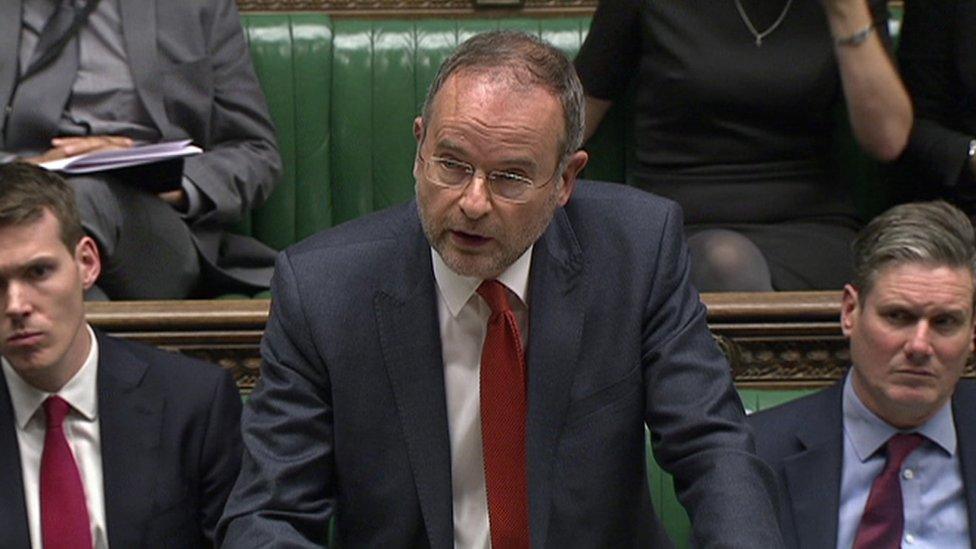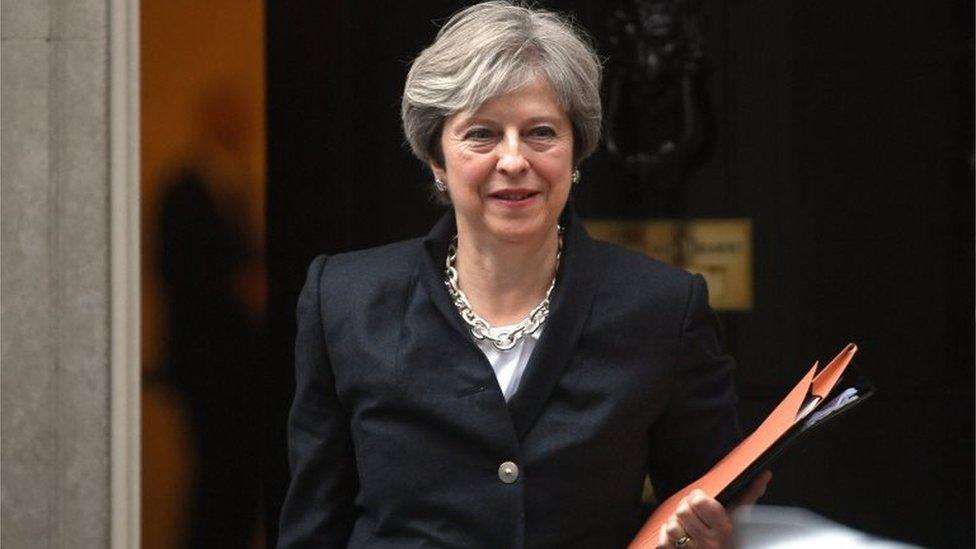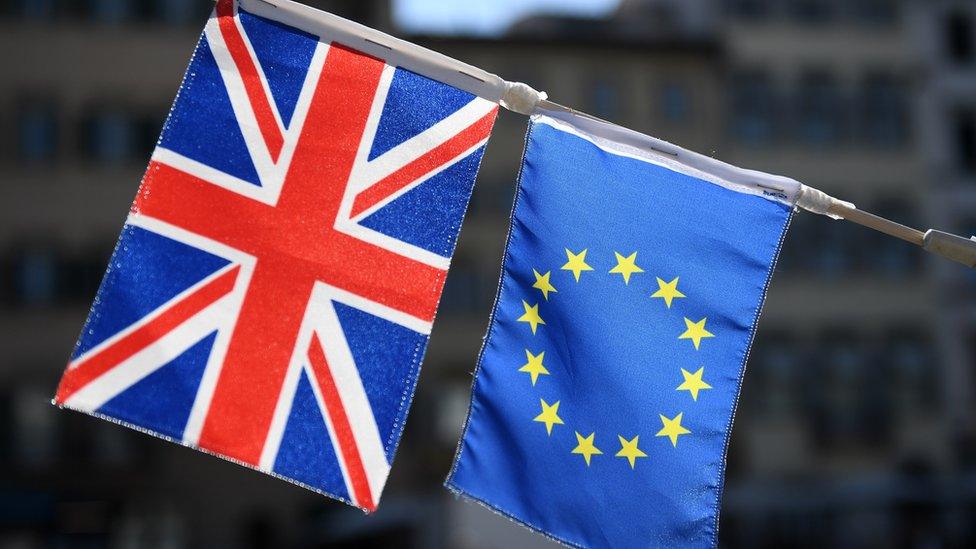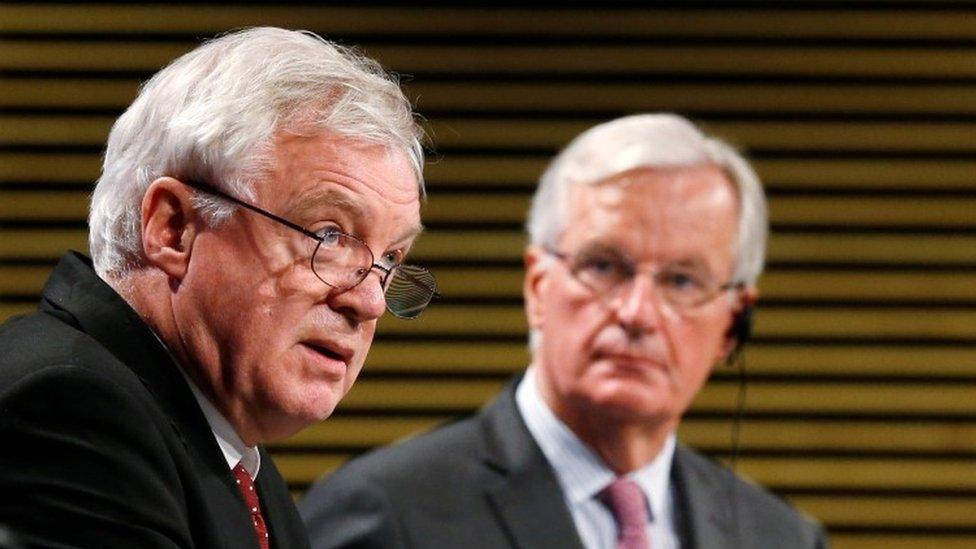Labour attacks Brexit date 'gimmick' as MPs begin scrutiny
- Published
- comments
What's going on with the EU Withdrawal Bill?
Several Tory MPs have joined Labour in demanding Theresa May withdraw a key Brexit legislation amendment to set the exact time of EU departure in law.
Ministers say being "crystal clear" about when the UK will leave on 29 March 2019 will give maximum certainty.
But ex-chancellor Ken Clarke said the move was "silly" while Dominic Grieve said it would "fetter" ministers' hands if talks dragged on to the last minute.
Labour has branded it a "gimmick" and said it will vote against it.
The row came as MPs began debating the European Union (Withdrawal) Bill in depth for the first time, a crucial piece of legislation paving the way for the UK's withdrawal by essentially copying all EU law into UK law.
Tuesday's marathon eight-hour debate is the first of eight sessions over the next month in which MPs will pore over the details of the government's Brexit strategy and seek changes.
The government saw off the first challenge to the bill as Plaid Cymru's call for the Scottish Parliament, Welsh Assembly and Northern Ireland Assembly to give their consent before the 1972 European Communities Act - which paved the way for the UK to originally join the then European Economic Community - can be repealed was defeated by 318 to 52 votes.
A government amendment to enshrine the Brexit date and time - 23:00 GMT on 29 March 2019 - in law, announced by Mrs May last Friday, will not be debated until the final day of the committee stage next month.
But it dominated the early skirmishes in the Commons as Labour's Sir Keir Starmer said setting a date in law was a "desperate gimmick" that was "about party management not the national interest".

Labour says it is a question of how, not if, the UK leaves the EU that matters
"The government's amendments to their own Bill would stand in the way of an orderly transition and increase the chance of Britain crashing out of Europe without an agreement," the shadow Brexit secretary said.
"Theresa May should stop pandering to the 'no deal' enthusiasts in her own party and withdraw these amendments."

What is happening on Tuesday:
The EU Withdrawal Bill is entering its Committee stage - meaning MPs will scrutinise it line-by-line
First up is a four hour debate on the repeal of the 1972 European Communities Act, the legislation that took Britain into the EU, or the EEC as it was then called
MPs could discuss a call for the UK to stay in the EU until a new treaty has been signed on its future relationship
Another amendment that has support is one that would give the devolved governments in Scotland, Wales and Northern Ireland a bigger say
About 7pm: Four hours of debate on how to interpret 40 years of accumulated EU law in UK law
The future status of the European Court of Justice, which will cease to set UK laws on Brexit day, is also up for debate
MPs are due to vote at about 7pm and 11pm but the government is not expected to be defeated at this stage
A further seven days of debate have been scheduled in the run-up to Christmas, with the second day, on Wednesday, expected to include Labour's calls for guarantees on workers' rights and the environment.

But former Tory attorney general Dominic Grieve said that fixing the precise time of withdrawal at this stage would "fetter" the government's hands if negotiations dragged on longer than expected and the process needed to be extended in order to reach an agreement.
Describing it as a "mad" idea that had not been discussed by the cabinet, he said it had been "accompanied by blood-curdling threats that anyone who might stand in its way was somehow betraying the country's destiny".
"I am afraid I am just not prepared to go along with it," he told MPs.
And former chancellor Ken Clarke, the only Tory to vote against triggering Brexit, condemned what he said were "silly amendments thrown out" solely to get positive coverage in Brexit-supporting newspapers.
Field: 'I've always bought my houses'
Ken Clarke attacks government over Brexit bill
Labour's Frank Field said he agreed with the need for a deadline, saying he had never taken on a job without a start date or bought a house without knowing when he would take possession.
He agreed to withdraw his own amendment, specifying a date but not a precise hour of departure, after Brexit minister Steve Baker warned of "legal chaos" if the issue of timing was not "put to rest".
"The government wants this bill to provide as much certainty as possible," Mr Baker added. "We recognise the importance of being crystal clear on the setting of exit day."
Ministers say the main aim of the EU (Withdrawal) Bill is to copy across EU rules into domestic UK law to ensure a smooth transition on the day after Brexit but critics say it is a power grab by the government which will allow ministers to change laws and regulations without going through Parliament first.
Most MPs say they accept that Britain is leaving the EU but some are expected to use the debates to fight against what they call a "hard Brexit" where the UK leaves without a trade deal.
Davis: Parliament will be given time to debate, scrutinise and vote on the final deal with the EU
MPs have tabled more than 470 amendments - running to 186 pages - for changes they want to see before the Brexit bill is passed into law by both the Commons and the Lords.
The government is not thought to be facing the serious prospect of defeat until next month, with a small group of about 10 Conservative rebels reportedly plotting with Labour and other opposition parties.
MPs were told on Monday they would be able to debate and vote on any agreement negotiated with the EU by the government as the Brexit deal would have to become law via an Act of Parliament.
But Brexit Secretary David Davis said the UK would still leave the EU on 29 March 2019, whether MPs backed or rejected the deal - making MPs' vote a take-it-or-leave-it one on the Brexit deal, rather than one which could either halt Brexit or have the deal renegotiated.
Speaking in the Commons, the SNP's Stephen Gethins said MPs were being offered a choice between a "really bad deal and a really, really bad deal" which he said was "no choice at all".
- Published10 November 2017

- Published19 October 2017

- Published9 November 2017
